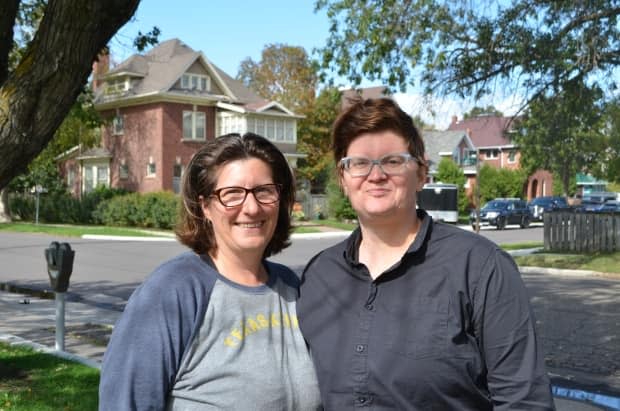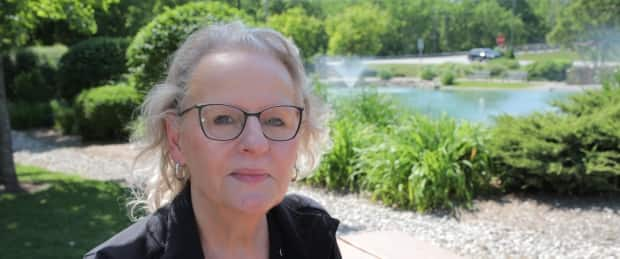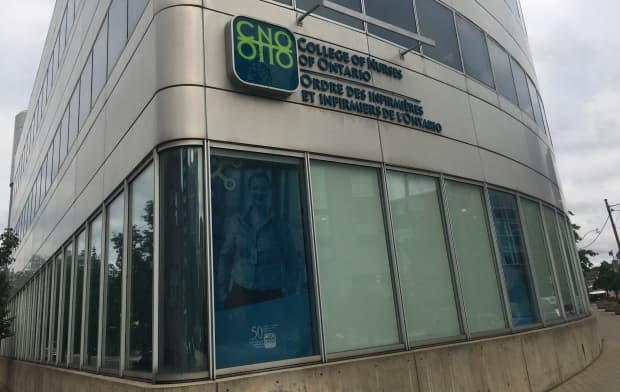Forced to sit out during pandemic, nurse calls for changes to Ontario's registration process

When her Canadian wife was offered an exciting new job in Thunder Bay in the summer of 2019, Christy Tashjian and her family made the big decision to move from Texas to northwestern Ontario.
Trained and working as a nurse practitioner in the United States, Tashjian told CBC News that she didn't think it would be a big deal to transfer her licence and get her registration to work in Ontario.
So they moved to Thunder Bay at the beginning of 2020.
But more than 20 months later, through the global pandemic and warnings about nursing shortages and burnt-out health-care workers, Tashjian hasn't been able to work due to delays in receiving a work permit from the Canadian government and her licence from the College of Nurses of Ontario (CNO).
"It's just been really frustrating knowing that I have these skills that could be used here in Thunder Bay, especially with the shortage of health-care providers, and here I am, sitting at home," Tashjian told CBC News.
This story of an internationally educated nurse sidelined by long delays is common, according to leaders of two associations that represent nurses in Ontario.
It's something they agree needs to change.
'I didn't think it would take this long'
When they first arrived to Canada, Tashjian said she planned to take some time off work to adjust to her new setting. But when the pandemic started, she realized her services might be needed, so in April 2020 she began the process of getting registered to work as a nurse practitioner in Ontario.
As she started filling out her application to the CNO, which regulates the profession and provides certificates of registration to nurses allowed to work in the province, Tashjian said she realized she couldn't complete the application until she received a work permit from the Canadian government.
Expecting it would take four to six months, Tashjian submitted her application for a work permit right away, but didn't receive it until July 2021.
Then, a temporary glitch on the CNO's website for a select group of applicants meant she wasn't able to submit her application to register as a nurse practitioner in Ontario until the end of August.
Tashjian is waiting on some of the paperwork from the United States to arrive to Canada. She's also waiting for the CNO to process that information before letting her know if she has the qualifications to work as a nurse practitioner or if she will need additional education.
"It's really, really frustrating," Tashjian told CBC News. "I didn't think it would take this long at all."
Nurses' union, associations call for action
Long delays and stories of frustration are something Vicki McKenna hears all the time. She's the provincial president and spokesperson for the Ontario Nurses Association (ONA), which represents 68,000 registered nurses.
"We are desperate. We need people in the system and we need them as quickly as we can get them," McKenna told CBC News. "This is a workforce that we need supported."
The drastic shortage of nurses isn't a new issue, McKenna said, and is a problem that's growing as older nurses retire and younger nurses begin looking to change careers, feeling unsupported and overworked.

"We're seeing 18 to 20 per cent vacancy rates in our hospitals. That equates to hundreds and thousands of vacancies," McKenna added. "We are facing the worst nursing crisis shortage in my career, and I have been in the field for a number of decades."
That same alarm bell has been sounded time and again by Doris Grinspun, chief executive officer for the Registered Nurses' Association of Ontario (RNAO), a professional association representing registered nurses, nurse practitioners and students.
"Enough is enough with this. Number one, we are in a terrible crisis situation. Number two, if we don't fix it, nurses will go to the U.S.," Grinspun told CBC News. "The process is too cumbersome."

Speaking about the delays in getting internationally educated nurses to work, Grinspun said: "It needs to be fixed because it's a disservice to Ontarians, it's a disservice to newcomers and to the profession, quite frankly."
Both organizations are demanding that the federal government, which is responsible for issuing work permits, fast track the granting of permits to people looking to work in health care.
They also want to see the CNO streamline their processes and expedite people as best they can to get nurses and nurse practitioners who are ready and able into the workforce.
Having gone through this entire waiting process, Tashjian has a specific suggestion of her own.
She said that for internationally educated nurses, the college could have a process in place to let people waiting for their work permits know what kind of additional qualifications or education they may need to be able to work in Ontario.
"My licence is a nurse practitioner in Texas, so I may not have the exact classes or qualifications that I need to work in Ontario. Knowing that ahead of time, I could have been taking the classes I might need while I wait."
Tashjian added, "Most health-care providers go into this work wanting to help ... and when we aren't able to, it feels a little dehumanizing, and it's made me feel kind of trapped in."
Ministry, college working to improve processes
But there is not much more that could be done to expedite these processes, according to the two organizations responsible for issuing permits and licences that Tashjian needs to work.
A statement from Immigration, Refugees and Citizenship Canada (IRCC) said the global pandemic has affected processing times. It said it has prioritized applications from workers in essential occupations like health care, but that applicants eligible for priority processing need to have a valid job offer in advance.
The IRCC said it is moving towards a modernized "working environment in order to help speed up application processing globally."

Meanwhile, the CNO said it would not provide an interview to CBC News and shared a written response to questions instead.
The CNO's statement said it is working to improve the application process, but COVID-19 has had an impact on some applicants, including making it more difficult to access documentation necessary for registration.
Between January and August 2021, the CNO said, it registered 2,259 internationally educated nurses (IEN), a few dozen more than the total number of IENs registered in all of 2020.
However, it said the registration process for IENs could still take anywhere from three to 18 months, and it was unable to provide the total number of applicants still waiting to be registered to work in the province.

 Yahoo Movies
Yahoo Movies 